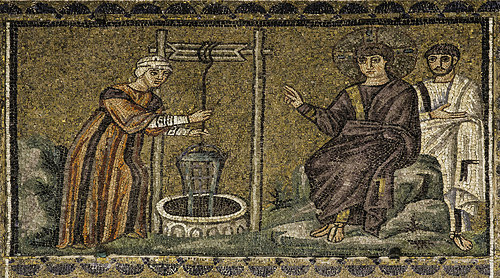We run our website the way we wished the whole internet worked: we provide high quality original content with no ads. We are funded solely by your direct support. Please consider supporting this project.

God is Different Than You Think
The revelation of “[a] God humiliated even unto the cross,” as Pascal put it, flies in the face of what most Jews of Jesus’ time, and of what most people throughout history, have expected God to be. In this light, we can discern the thematic centrality of the cross in Jesus’ many teachings that reverse common expectations about God.
For example, few people in Jesus’ day would have expected God to “justify” a tax collector who was too ashamed to “even look up to heaven” (Lk 18:13) instead of the righteous Pharisee who fasted twice a week, gave a tenth of all he earned to God, and thanked God he was not like “robbers, evildoers, adulterers” or “this tax collector” (vss. 11-2). Similarly, few if any expected God to welcome into his kingdom “tax collectors and prostitutes” before religious leaders whom everyone held in high esteem (Mt 21:31; cf., Lk 7:38-50). Indeed, because the God he revealed was so contrary to what people expected, Jesus repeatedly taught that those whom most assumed were “outsiders” would find themselves “inside,” while those whom most assumed were “insiders” would find themselves “out” (e.g., Mt 7:21-3; 22:1-9; 25:31-46). All of these anticipate the great reversal of the cross, where God entered into total solidarity with “outsiders” by becoming a crucified “outsider.”
Along the same lines, not many in Jesus’ day would have expected God to “leave in an open country” the ninety-nine sheep who were where they belonged to search for the one that got lost, and to then throw a neighborhood party to celebrate its rescue once he found it (Lk 15:3-7). Nor would they have thought God would be like a father who persistently looked for his wayward son to return home, despite the fact that this son had brought him shame by demanding, and then squandering, his entire inheritance (Lk 15:11-20). Still less would have expected God to be like this father as he joyfully ran to welcome his son “while he was still a long way off,” hugging and kissing him once he got there, restoring his status as son by placing the family robe and ring on him, and then throwing a large feast over his return, all without requiring so much as an apology for his actions (vss. 20-4). The God whose mercy shocks our sensibilities as he identifies with sinners on the cross was already shocking people’s sensibilities by identifying with “tax collectors and sinners” (e.g., Lk 15:1-2; cf., Mt 9:10-1; 11:19).
In addition, we can discern the character of the cross as well as harbingers of the cross not only in Jesus’ teachings, but also in his actions. To give just a few illustrations, Jesus’ successful battle against the devil’s temptations in the desert anticipates his final victory over Satan on the cross (Mt 4:1-11). So too, the battle Jesus continually waged against the kingdom of darkness by delivering people from demonic oppression anticipates his victory over this renegade kingdom on the cross, which has justifiably been called “the grand exorcism.”
On a different note, the manner in which Jesus’ love led him to serve and engage with people in ways that shocked the religious establishment of his day anticipates the shocking non-discriminating love of God revealed on Calvary. For example, Jesus rebelled against social norms by the dignified way he served, interacted with, and even touched, lepers as well as other “unclean” people (e.g., Mt 8:1-3; 9:20-2; 10:8; 11:5; 26:6). So too, the manner in which Jesus served and engaged with the poor, the oppressed, people with infirmities (who were generally deemed to be afflicted by God), and women—even women with shameful pasts—violated first century Jewish social taboos as well.
Not only this, but the way Jesus consistently put the welfare of people before the meticulous observance of the law, offended the religious sensibilities of the status quo and in this way anticipates the religiously offensive love of God revealed on Calvary, when the “legal indebtedness” of all people was “nailed to the cross” (Col 2:15, cf., 16-7). And finally, the gracious manner in which Jesus interacted with, and spoke about, people whom most in his Jewish audience despised (e.g., Samaritans, Roman Centurions), sometimes holding them up as more exemplary than his fellow Israelites, was deeply countercultural and offensive (Mt 8:5-13; 15:21-8; Lk 10:25-37).
Behaviors such as these anticipate the wholly unexpected revelation of God on the cross, in which God’s love demolished “the dividing wall of hostility” between people groups in order to “create in himself one new humanity” (Eph 2:14-5). The shocking all-inclusive love Jesus demonstrated throughout his life, in other words, was summed up in, and most perfectly expressed by, the shocking all-inclusive love revealed on Calvary.
Image by Lawrence OP via Flickr
Category: General
Tags: Crucifixion, God, Jesus, Love, Sacrifice
Topics: Attributes and Character
Related Reading

The Politics of Jesus
Many are so conditioned by the mindset of the world that they can’t even envision an alternative way of affecting society and politics other than by playing the political game as it is done by the established governmental system. Some thus conclude that, since Jesus didn’t try to overhaul the political systems of his day…

By Chance or By God
pure9 via Compfight Is the world here by chance? Are we a product of an impersonal force that got the ball rolling and then history came about in what could be described as an “accident”? Greg’s father, an skeptic at the time, put it this way, “[C]ouldn’t we just have come about by accident? Isn’t…

What do you think of the “Penal Substitution” view of the atonement?
If asked what Jesus came to do and how he did it, most contemporary western Christians would automatically say something like, “Jesus took the punishment from God that I deserved.” This is what’s usually called “Penal Substitution” view of the atonement, for it emphasizes that Jesus was punished by God in our place. His sacrifice…

The Phinehas vs. Jesus Conundrum
I’ll be frank. This is not a blog that will be easy for some people to read. But it’s a blog I believe every follower of Jesus should read – even if you have to force yourself to press on. It’s about something we all wish was not true. It’s about the way the Bible…

Podcast: Did Jesus Descend Into Hell?
Greg psychologizes Christ on the cross. http://traffic.libsyn.com/askgregboyd/Episode_0343.mp3

A Brief Theology of the Trinity
“The economic Trinity is the immanent Trinity, and the immanent Trinity is the economic Trinity.” This is the maxim introduced by the Catholic theologian Karl Rahner that should shape our discussion of the Trinity. It is simply a short-hand way of saying that since the way God is toward us in Christ truly reveals God,…
